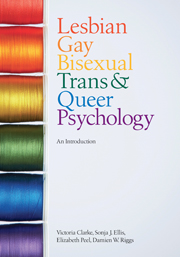Book contents
- Frontmatter
- Contents
- List of boxes
- Introduction: how to read and use this book
- Section I History, contexts and debates in LGBTQ psychology
- Section II Understanding social marginalisation in LGBTQ lives
- 4 Diversity
- 5 Prejudice and discrimination
- 6 Health
- Section III LGBTQ experiences across the lifespan
- Conclusion
- Glossary
- Additional resources
- References
- Index
- References
4 - Diversity
from Section II - Understanding social marginalisation in LGBTQ lives
- Frontmatter
- Contents
- List of boxes
- Introduction: how to read and use this book
- Section I History, contexts and debates in LGBTQ psychology
- Section II Understanding social marginalisation in LGBTQ lives
- 4 Diversity
- 5 Prejudice and discrimination
- 6 Health
- Section III LGBTQ experiences across the lifespan
- Conclusion
- Glossary
- Additional resources
- References
- Index
- References
Summary
Overview
• Understanding diversity in LGBTQ communities
• Gender
• Bisexuality
• Trans and queer
• Social class
• Race
• Organised religion and spirituality
• Rural life
• Ability
Understanding diversity in LGBTQ communities
In this chapter we focus on the wide diversity that exists within LGBTQ communities, and the many different identities that LGBTQ people have. The chapter serves as a bridge between the opening three chapters, that together provide an overview of the field of LGBTQ psychology and its key theoretical, conceptual and methodological concerns, and the rest of the book, which focuses on key topics in LGBTQ psychology.
Focusing on the diversity of LGBTQ communities is important because it allows us to understand the limitations of applying one particular model of psychological research and practice across a range of groups of people. Although we primarily draw on research conducted with white, middle-class lesbians and gay men in this book, we are mindful of the fact that the experiences of this group do not represent the experiences of all LGBTQ people. Furthermore, it is not accurate to say that lesbians and gay men together form a coherent or unified group. In this chapter we highlight the breadth of experiences of LGBTQ people, drawing on the limited psychological research that is available, as well as on work from other academic disciplines and areas of research such as sociology, feminism and queer theory.
- Type
- Chapter
- Information
- Lesbian, Gay, Bisexual, Trans and Queer PsychologyAn Introduction, pp. 81 - 102Publisher: Cambridge University PressPrint publication year: 2010



